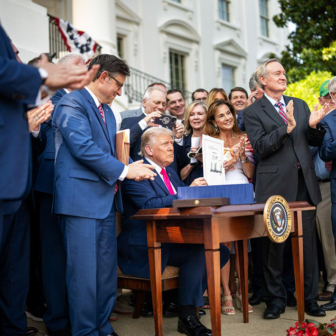When a government suffers a pounding at a by-election, a favourite game of political journalists involves plotting the two-party-preferred swing against the national pendulum and announcing, with much drama, that, “if repeated at the next election” this result would see said government thrashed in a landslide.
But what to do when the swing is the other way — to the tune of a big 7.4 per cent (which, for the record, would reap twenty-six Labor seats on the pendulum) — as we saw in New England on Saturday, and yet the government consistently performs abysmally in national voting-intention polls?
The answer, and this applies to all by-elections, is to resist the urge to extrapolate anything at all from the result. By-elections are grossly over-interpreted by the political class in this country and are barometers of not much at all — or at least not much that we can comprehend. Most importantly, because fates of governments are not at stake, by-elections allow people to vote with other factors in front of mind.
Barnaby Joyce’s big result — at last count, a 64.8 per cent primary vote and 73.8 per cent after preferences — verifies that he is a popular sitting member. Then again, rural MPs tend to enjoy popularity; on average, they have high personal votes (as measured, for example, by comparing lower house and upper house support for their parties). Independent Tony Windsor certainly enjoyed immense esteem — and wins of similar magnitude to Barnaby’s on Saturday — as sitting MP in that electorate from 2001 to 2010.
From 2010 to 2013 many Labor supporters projected all sorts of fuzzy attributes onto the denizens of New England — so wise were they in repeatedly electing a person of the calibre of Windsor — but his September 2010 decision to support Julia Gillard and Labor, and the subsequent toxic standing of that government, went down diabolically in his electorate. Windsor wisely sat out the 2013 election — he would have been thrashed, by Joyce or any other Nationals candidate — but in 2016, with the gloss removed from the Abbott and then Turnbull governments, he reasonably judged his chances as not bad. On the day, though, he was soundly defeated by one-term MP Joyce.
The speed and enthusiasm with which New England voters shifted their affection to the current member must be galling for Windsor.
Saturday’s result also suggests that voters aren’t inclined to blame MPs for falling foul of section 44 of the Constitution. So, while it should give no encouragement to the Coalition at the next general election, it does provide hope for John Alexander in Bennelong on the Saturday after next. (The fruits of Labor senator Sam Dastyari’s need to ingratiate — obsessive even by Sussex Street standards — may have already cruelled Kristina Keneally’s chances.)
Two years and three months ago, an upcoming by-election in the Western Australian seat of Canning generated a huge amount of fuss in the Liberal Party. Bizarrely, it became a test of prime minister Tony Abbott’s leadership, when it was all but irrelevant in terms of numbers in parliament. (In the end, assisted by the fevered anticipation, Abbott lost his job before the poll.)
Yet now, in December 2017, with the outcome of Bennelong potentially affecting the fate of the government in the House of Representatives, Malcolm Turnbull has so far escaped an equivalent ultimatum. Partly that’s because parliament will have closed shop by the time the result is in.
But it’s also because, despite recent travails, Turnbull retains greater respect and approval in the community than Abbott ever did. Liberal deputy Julie Bishop has overtaken him as preferred leader in surveys, but by nothing like the leads that Turnbull enjoyed over his predecessor. And, as luck would have it, the final week of parliament commences with an Ipsos poll in Fairfax papers showing a big majority in favour of the proposition that prime ministers “should be allowed to serve a full term.”
That Ipsos poll, like today’s Newspoll, has a Labor two-party-preferred lead of 53–47, off mid-thirties primary support for both sides. A week that should see same-sex marriage become law will still be a long one for the prime minister. He hasn’t quite made the year out yet — it’s just possible that something unfortunate will happen or someone will give the leadership can one last kick — but he’s almost there.
Who would the party room turn to? The foreign ministry always flatters its occupant — immersed in important international affairs, floating above grubby day-to-day politics — and colleagues would recall Bishop’s limitations from her unhappy time as shadow treasurer in 2008.
Scott Morrison, like Wayne Swan on the other side, has been trying for years to insert himself into the living-room psyche and push to double digits as preferred leader, but doesn’t quite get how those voters operate. (Actually, Swan these days, with his Corbynesque economic pronouncements, seems to mostly play to the Labor membership and, as they now get half a say in any leadership vote, he might be onto something.)
Immigration minister Peter Dutton is adored on Sky News after dark, largely because he betrays not a skerrick of sympathy for the plight of people we lock up in the South Pacific. But he remains on Morrisonesque numbers — around 5 per cent, even less than Abbott. (Sadly for Dutton, ordinary Liberal Party members don’t get a vote.)
Turnbull, meanwhile, remains ahead of Bill Shorten as preferred prime minister, which doesn’t amount to much in itself but is taken very seriously by MPs and party operatives.
So he has likely survived to 2018, when it will all start again. The bad polls will continue, and particularly that date with destiny, the thirtieth losing Newspoll in a row, which will probably arrive in March.
Figures from one online betting agency imply odds of 50 per cent that he’ll still be prime minister in 2019.
That seems highly, wildly optimistic for him. ●





